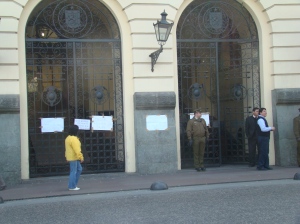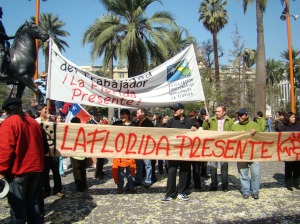My ability to use and understand language only applies to English. I’m not one of those with an aptitude for languages. Yet I’ve traveled to different countries without much difficulty. I find it refreshing and rejuvenating to observe and use other sense for a change. I quiet myself. Later, I record my impressions in a journal.
I always carry a small book of translations, and I learn the basic and essential words for “thank you,” “please,” “hello,” “excuse me,” “I’m sorry,” “where is the bathroom?,” and “red wine.”
In Paris, I needed to add the word for cheese (fromage). It might have prevented me from buying a pound of butter instead of cheese from a street vendor. I felt the large squares wrapped in white paper for firmness, not name. In Marrakesh, I might never have ridden a camel if I’d understood I needed to hand over $60 for a 10-minute ride around a desert park in the middle of the city. The camel tenders refused to help me off until I paid.
In Santiago, Chile, I wandered the streets and read the history of the country. During the 1973 revolution, I read about the suicide of Chile’s socialist president Dr. Salvador Allende, the uncle of one of my favorite authors, Isabelle Allende. Rather than be taken by General Augusto Pinochet’s armies, Allende killed himself in the presidential palace.

I immersed myself in the poetry of Chilean poet Pablo Neruda. I visited his secret home, La Chascona, in the Bellavista neighborhood of Santiago. Pinochet’s men overtook this house during the revolution. Today it is a well-preserved museum.
With my head filled with revolution, I headed the Plaza Italia. A rather dull and plain building sits on one end of the plaza.

I read that citizens come to the building, now the Defense Ministry, and hold demonstrations outside in the shadow of the large statute of General Manuel Baquedano and his horse.  No wonder when I heard the drums beating and people shouting as I sat on a park bench writing, I thought a revolution was in the making once again.
No wonder when I heard the drums beating and people shouting as I sat on a park bench writing, I thought a revolution was in the making once again.
I saw at least one hundred people marching toward the Defense Ministry. They carried banners and pounded drums. My heart beat faster as I grabbed my camera and began shooting photos as fast as I could. People started climbing the statute. I strode in front of the banner bearers at the front of the line and continued to take pictures. I was shooting so fast, I didn’t read the sign. The noise became cacophonous.
I pulled the camera from my face and read “La Florida” on a banner. I thought my home state must have done another outrageous act, this time in the world of international politics.
A young man, holding one end of the banner, smiled at me. I approached him, hoping he might understand my English combined with horrible Spanish. He spoke English.

“What are you protesting?” I asked.
He smiled broader. “No protest. We celebrate today.”
“Celebrate what?”
“We love flowers,” he said. “We celebrate flowers.”
I didn’t need a translator to understand that. Revolution indeed.


5 responses to “A Revolution for Flowers”
Amazing post! Thank you for sharing your experiences.
LikeLike
Thanks, Kate. Glad you stopped by and enjoyed the post.
LikeLike
We could use a few more flower revolutions now and again. 🙂
LikeLike
Absolutely! I was delighted and smile every time I remember.
LikeLike
Reblogged this on Odyssey to Myself.
LikeLike